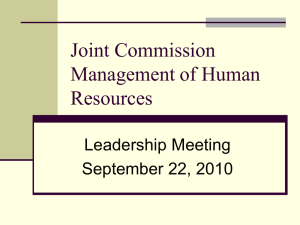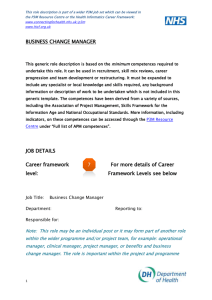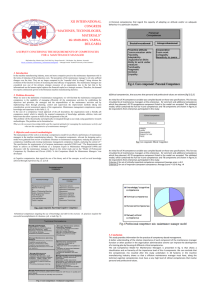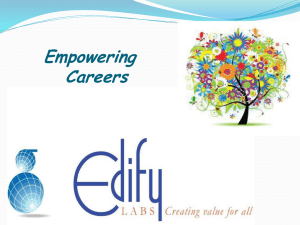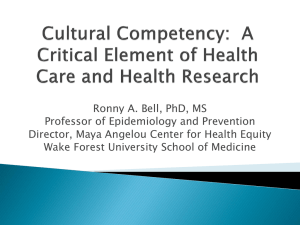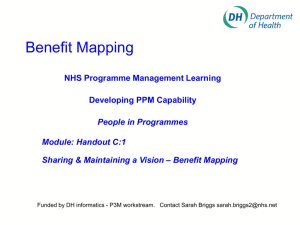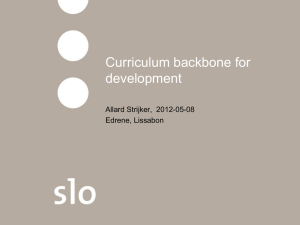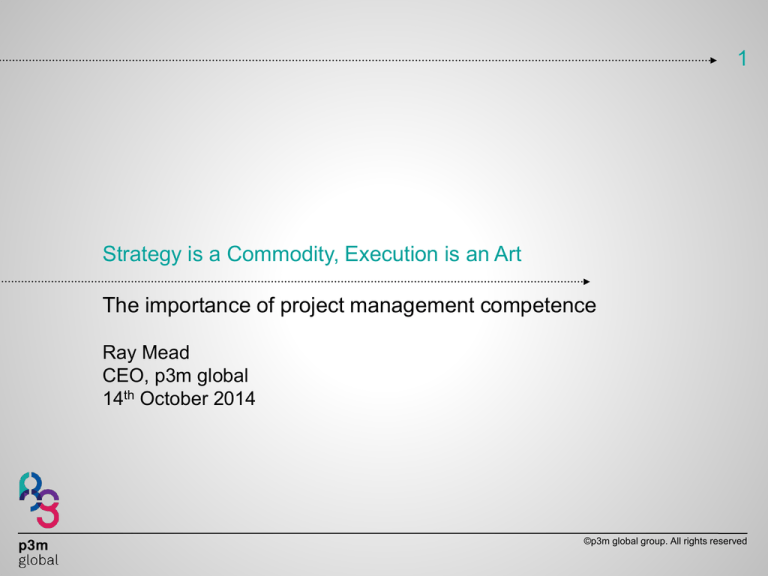
1
Strategy is a Commodity, Execution is an Art
The importance of project management competence
Ray Mead
CEO, p3m global
14th October 2014
©p3m global group. All rights reserved
p3m global
3
©p3m global group. All rights reserved
Skills v Competencies
Skill
Competency
• A proficiency acquired
through knowledge,
experience or practice
• Learned ability to be able to
carry out one or more job
functions or achieve a
predetermined result
• A set of behaviours or
actions to be performed in a
specific context
• Organisation-specific
• A cluster of abilities,
commitments, behaviours,
knowledge and skills
enabling superior
performance
• Learned over years
• E.g. ‘Analytical ability,’
‘Leadership’
• ‘The How’
• Learned over months
• E.g. ‘Java Programming,’
‘Event Planning’
• ‘The What’
4
Both should be measurable
©p3m global group. All rights reserved
Definitions of Competency
5
“a reliably measurable, relatively enduring characteristic
(or combination of characteristics) of a person, team or
organisation, which causes and statistically predicts a
criterion level of performance.”
Lyle Spencer
“The demonstrated ability to perform activities within a project environment
that lead to outcomes based on defined and accepted standards….
….Competent project managers consistently apply their project management
knowledge and personal behaviours to increase the likelihood of delivering
projects that meet stakeholders’ requirements….
….Competent project managers bring together their knowledge, skills, personal
characteristics and attitudes when focusing on delivering a project.”
PMI Project Manager Competency Development Framework 2nd ed.
©p3m global group. All rights reserved
What is Competence?
6
©p3m global group. All rights reserved
Competent Driving
7
©p3m global group. All rights reserved
88
competence
frameworks
Competency Dictionary
9
Working in a conscientious, consistent and thorough manner.
Level 1
Level 2
Level 3
Recognises obvious information
Recognises less obvious information
Demonstrates concern for thoroughness Quickly identifies relevant information
thoroughness and accuracy
Identifies obscure details that are
are important within a context of
of distracting information
Quickly identifies relevant and
irrelevant information when
reading complex documents.
Consistently identified all relevant
details that are not obvious in
complex and technical documents.
Maps out all the logistics and
details of a situation to ensure
smooth and flawless
implementation.
Identifies the subtleties of
judgements rendered.
Requires the highest standards
for accuracy and quality for
his/her work.
Establishes processes to ensure
the accuracy and quality of work
products and services delivered
by his/her team.
Identifies main concepts and ideas
when reading simple,
straightforward documents.
Verifies assumptions and
information before accepting
them.
Reviews own work for accuracy
and completeness, spotting
inconsistencies that indicate
problems with quality of work.
Seeks out others to check or
review own work.
Pays close attention to details that
are important to others to make
sure they are right.
Reviews all relevant information
or aspects of a situation before
taking action or making a decision.
Level 4
Identifies multiple
sources/approaches of
information to ensure that details
are addressed.
Reviews the work of others for
accuracy and thoroughness.
Level 5
Follows up to ensure tasks are
completed and commitments are
met by others.
Verifies that work has been done
according to procedures and
standards.
©p3m global group. All rights reserved
SFIA
10
©p3m global group. All rights reserved
APM 5 Dimensions of Professionalism
11
Breadth
APM Body of Knowledge
Depth
APM Competence Framework
Achievement
APM Qualifications
Commitment
Continuing Professional
Development
Accountability
APM Code of Professional Conduct
©p3m global group. All rights reserved
APM ‘Wheel of Competence’
12
©p3m global group. All rights reserved
Concept
Project Success
Stakeholder Management
Requirements Management
Project Risk Management
Estimating
Business Case
Marketing & Sales
Project Reviews
Definition
Scope Management
Modelling & Testing
Methods & Procedures
Project Quality Management
Scheduling
Resource Management
Information Management
Project Management Plan
Configuration Management
Change Control
Implementation
Technology Management
Budget & Cost Management
Procurement
Issue Management
Development
Value Management
Earned Value
Value Engineering
Handover & Closeout
•
•
•
•
•
•
•
•
•
Communication
Teamwork
Leadership
Conflict Management
Negotiation
Human Resource Management
Behavioural Characteristics
Learning & Development
Professionalism & Ethics
Contextual Competencies
•
•
•
•
•
•
•
•
•
•
•
•
•
•
•
•
•
•
•
•
•
•
•
•
•
•
•
•
•
•
Behavioural Competencies
Technical Competencies
APM Competence Framework
•
•
•
•
•
•
•
•
13
Project Sponsorship
Health, Safety and Environmental Management
Project Life Cycles
Project Finance & Funding
Legal Awareness
Organisational Roles
Organisational Structure
Governance of Project Management
©p3m global group. All rights reserved
PMI Competency Development Framework
14
Knowledge Competencies:
What the project manager knows about
project management
Performance Competencies:
How the project manager
applies
Personal Competencies:
How the project manager
behaves when performing
activities within the project
environment.
Industry Specific Competencies:
In some industries there may be specific
knowledge, skills or attitudes that are needed
to succeed therein..
Project knowledge to project
activities
in a live environment
Organisational Competencies:
There may be specific elements of
the organisation in which a project
manager works that, when
mastered, enables them to perform
better. This may be the ability to use
certain systems, methods, escalation
paths and other organisational
process assets
©p3m global group. All rights reserved
PMI Competencies
15
Performance Competencies
1.0 Initiating a Project
2.0 Planning a Project
3.0 Executing a Project
1. 1 Project aligned with organisational
objectives and customer's needs
2.1 Project scope agreed
3.1 Project scope achieved
2.2 Project schedule approved
3.2 Project stakeholders expectations
managed
1.2 Preliminary scope statement
includes stakeholders needs and
expectations
1.3 High-level risks, assumptions and
constraints are understood
1.4 Stakeholders identified and their
needs understood
1.5 Project charter approved
2.3 Cost budget approved
2.4 Project team identified
2.5 Communications activities agreed
2.6 Quality management process
established
3.3 Human resources managed
3.4 Quality managed against plan
3.5 Material resources managed
2.7 Risk response plan approved
2.8 Integrated change control processes
defined
2.9 Procurement plan approved
2.10 Project plan approved
4.0 Monitoring & Controlling
5.0 Closing a Project
4.1 Project tracked and status
communicated to stakeholders
5.1 Project outcomes accepted
4.2 Project change is managed
4.3 quality is monitored and
controlled
5.2 Project resources released
5.3 Stakeholders perceptions
measured and analysed
5.4 Project formally closed
4.4 Risk is monitored and controlled
4.5 Project team is managed
4.6 Contracted administered
©p3m global group. All rights reserved
PMI Competencies
16
Personal Competencies
6.0 Communicating
7.0 Leading
8.0 Managing
6.1 Actively listens,
understanding and responds to
stakeholders
7.1 Creates a team environment
that promotes high performance
8.1 Builds and maintains the
project team
7.2 Builds and maintains
effective relationships
8.2 Plans and manages for
project success in organised
manner
6.2 Maintains lines of
communication
6.3 Ensures quality of
information
6.4 Tailors communication to
audience
7.3 Motivates and mentors
project team members
7.4 Takes accountability for
delivering the project
8.3 Resolves conflict involving
project team or stakeholders
7.5 Uses influencing skills when
required
9.0 Cognitive Ability
10.0 Effectiveness
11.0 Professionalism
9.1 Takes a holistic view of
project
10.1 Resolves project
problems
11.1 Demonstrates
commitment to the project
9.2 Effectively resolves issues
and solves problems
10.2 Maintains project
stakeholder involvement,
motivation and support
11.2 Operates with integrity
9.3 Uses appropriate project
management tools and
techniques
9.4 Seeks opportunities to
improve project outcome
10.3 Changes at the required
pace to meet project needs
10.4 Uses assertiveness when
necessary
11.3 Handles personal and
team adversity in a suitable
manner
11.4 Manages a diverse
workforce
11.5 Resolves individual and
organisation issues with
objectivity
©p3m global group. All rights reserved
17
assessing
competence
Competence Assessment Approach
18
Spencer: ‘reliably measurable’ =
“two or more independent observers or methods (tests, surveys) agree statistically (usually r =.80)
that a person demonstrates a competency characteristic.”
©p3m global group. All rights reserved
Online Component: p3m pulse
19
©p3m global group. All rights reserved
Results: Scoring & Benchmarking
Level
Expert
Advanced Practitioner
Practitioner
Intermediate
Foundation
Score (%)
86-100
76-85
65-75
55-64
0-54
20
PMI Score
5
4
3
2
1
©p3m global group. All rights reserved
Results: Competence Assessment Reports
21
Each participant
receives a
Competency
Assessment Report
detailing their
assessment results
across the 5 areas
©p3m global group. All rights reserved
Results: Recommended Development Plans
22
©p3m global group. All rights reserved
2323
developing
competence
Developing Competence
24
©p3m global group. All rights reserved
Developing Competence
- Trial and error
- Cross-functional teams
- Special projects
- Community involvement
- Sabbaticals
- Learning
from others
- Coaching
- Mentoring
- Networking
25
- Instructorled courses
- eLearning
- Certifications
- Conferences
©p3m global group. All rights reserved
26
©p3m global group. All rights reserved
p3m pathways
27
©p3m global group. All rights reserved
2828
in
summary
Application of competence-based management
•
•
•
•
•
Performance-based pay
Clear career progression
Objective bonus criteria
Inputs into planning cycle
Continuous improvement
•
•
•
Know, Plan &
Manage
Reward
29
Team Gap Analysis
Job Descriptions
Weighted Interview Criteria
Acquire
•
•
•
Targeted Training
Intelligent
Mentoring
Develop
Coaching
Deploy
•
•
Trend & root cause
analysis
Pareto analysis
Right People
Right Skills
Right Place
Right Time
Analyse
Assess
•
•
Measuring
performance
Identifying strengths
and weaknesses
©p3m global group. All rights reserved
Benefits of P3M competence management
• Resource Management
- More targeted resource
allocation
- Reduced reliance on contract
resource
- Increased productivity through
capitalising on strengths
- Clearer view of organisational
capability
- Optimised Resources
• Recruitment
- More appropriate candidates
interviewed
- More objective hiring
decisions
- Lower recruitment costs
30
• Staff Development
- Reduced staff turnover
- Clearer career progression and
remuneration scales
- Performance-based reward
schemes
- Reduced training costs
- Enhanced staff motivation
• Project Performance
- Justifiable charge-out rates from
competency-based pricing
- More stable HR requirements
planning
- Reduced project risk
- Increased project profitability
©p3m global group. All rights reserved
Improving your P3M competence
31
6 ways to boost your competence
1.
Learn from your mistakes
- Lessons learned
- Seek feedback
2.
Know thyself
- Strengths & weaknesses
- Default personality settings
3.
Challenge Yourself
- Embrace the new and unfamiliar
- “Do one thing that scares you everyday”
4.
Eleanor Roosevelt
Set yourself some goals
- Make them SMART
- Contextualise them with career direction
5.
Target your training
- Training gives you skills – can you apply them?
6.
Find a Mentor
©p3m global group. All rights reserved
3232
?
questions
33
UK Office
1st Floor, St George's Chambers
St George's Street
Winchester, Hampshire
SO23 8AJ
Tel: +01962 676321
info@p3mglobal.co.uk
©p3m global group. All rights reserved
p3mglobal.com




